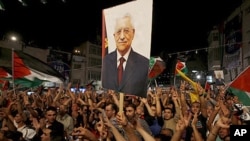The United Nations Security Council took its first official step Wednesday toward considering the Palestinian application for full U.N. membership, passing it to a special committee that will review it and make recommendations.
The standing committee on new members is tasked with deciding whether the territory known as Palestine meets the criteria for statehood, including possession of a defined territory and a recognized government. Under the U.N. Charter, a new member must also be “peace-loving.”
The committee will take up its work at the ambassador level on Friday morning and report its conclusions to the Security Council. The council will then decide whether to make a recommendation to the General Assembly via resolution.
A decision is not likely for weeks, but analysts say the bid is bound to fail because the United States has threatened to use Washington's veto power on the Security Council to block it.
After Wednesday's action, the Palestinian envoy, Riyad Mansour, told reporters the process is moving forward.
"We hope the Security Council [will] shoulder its responsibility and approve our application and send a recommendation to the General Assembly for the admission of Palestine to the United Nations," he said.
Last week, on the margins of the U.N. General Assembly, the Middle East Quartet - made up of the United States, Russia, the European Union and the United Nations - issued a call for the Palestinians and Israel to return to direct negotiations. Those talks broke down last September after Israel allowed a moratorium on settlement construction to expire.
On Tuesday, Israel announced that it would build 1,100 new homes for Israelis on annexed land in East Jerusalem that Palestinians want as part of a future state. Mansour called the action a clear answer from the Israeli government about negotiations.
"They gave 1,100 answers of saying 'no' to the effort of the international community of opening doors for negotiations," he said. "I think this speaks clearly that Israel is not interested in negotiating with us, in spite of the fact that they say they like to do so."
Mansour said Israel's construction plans violate tenets of prior negotiations and international law. "Those who are interested in peace and negotiation would abide by their obligation under the Road Map which calls for freeze of settlements," he said. "They would abide by international law which says that settlements are illegal."
Israel's U.N. Ambassador Ron Prosor said there are no short-cuts to a Palestinian state.
"I would like to emphasize that a Palestinian state - a real Palestinian state, a viable Palestinian state - will not be achieved in imposing things from the outside, but only in direct negotiations," he said, pointing to successful peace agreements between Israel with Egypt and Jordan.
“We can do it ourselves [and] we can do it by talking to each other," he said. "We know the problems; we know how tough this is. There are no shortcuts. There are no instant solutions here."
Both ambassadors said their governments would consider and respond to the Quartet stance, which calls both sides back to talks within one month and lays out a timeline for resolving outstanding issues by the end of next year.




